In 2019, Kimutai Koske Gideon, a devoted human rights defender from Bomet County, participated in the Defenders Coalition’s Human Rights Defenders (HRD) Academy. Specializing in advocating for the rights of children, women, persons with disabilities (PWDs), and marginalized groups, Kimutai’s journey has been driven by a deep passion for justice. The HRD Academy became pivotal in his advocacy work, offering him the tools and connections he needed to take his efforts to the next level.
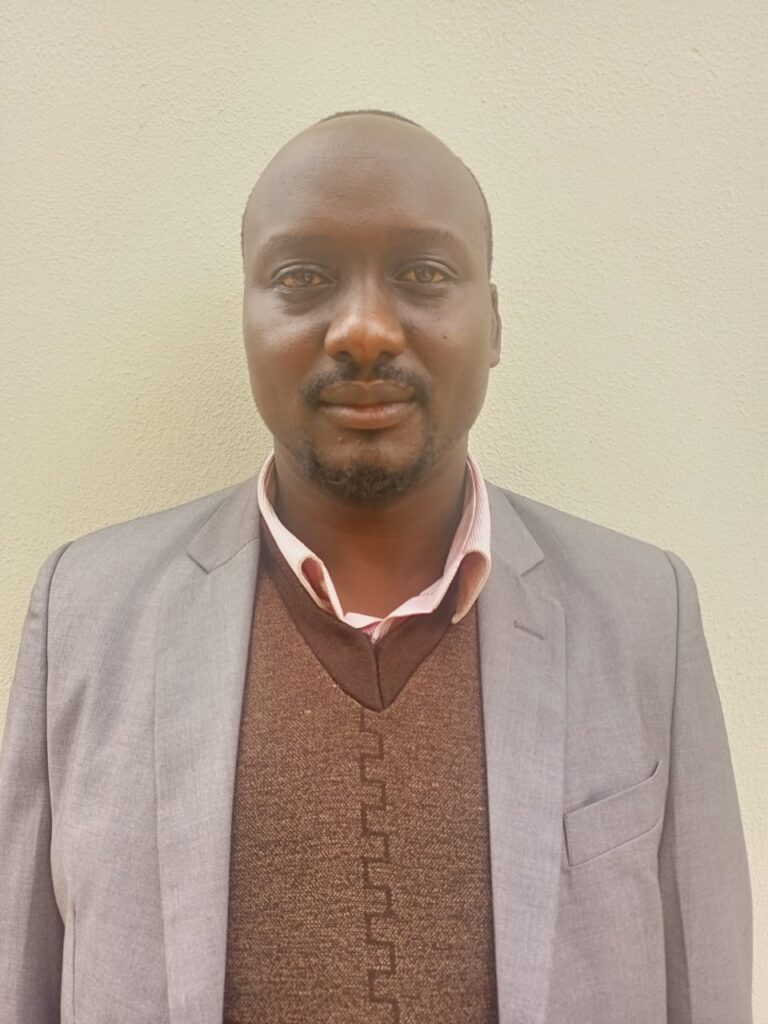
One of the most impactful takeaways from the Academy for Kimutai was learning about security and digital safety. “In our line of work, we often face serious threats,” he shares, “but the security skills I gained from the Academy have helped me protect myself and others while continuing the fight for human rights.” These lessons are now woven into the fabric of his daily work, helping him stay safe and navigate the often dangerous terrain of human rights advocacy with greater confidence.
What also struck Kimutai was the sense of community he discovered during the Academy. Meeting and connecting with other defenders from different parts of Kenya gave him a renewed sense of purpose. “The networking was invaluable,” Kimutai reflects, “I was able to build lasting relationships with other defenders who are just as passionate about justice.” These relationships led to the creation of Combined Efforts Now, a network of defenders in Narok County, and the Human Rights Network for the South Rift Region, which spans Bomet, Kericho, and Narok counties. Through these networks, Kimutai and his peers have been able to elevate the voices of marginalized communities, advocating for their rights and shining a light on the injustices they face.
Since his time at the Academy, Kimutai has been applying the skills he learned to support fellow defenders in his community. “Before, documenting human rights violations felt overwhelming,” he says, “but now, I can monitor and document abuses with ease, making sure that every case is recorded and reported.” This has not only empowered him but has also equipped others around him to take action and push for justice more effectively.
For Kimutai, the most inspiring aspect of the Academy was the shared experience of being surrounded by other defenders. “We all came from different backgrounds, but we had one goal—to stand up for those who can’t stand up for themselves,” he recalls. This sense of unity has continued to fuel his drive to create meaningful change in his community.
Looking forward, Kimutai remains deeply committed to the cause. With the knowledge, skills, and connections gained from the HRD Academy, he is now better equipped to advocate for the rights of the most vulnerable. “The Defenders Coalition has been a beacon of support for us,” he says. “Because of them, we can do more, reach further, and continue this vital work.”
Through his resilience and unwavering dedication, Kimutai Koske Gideon continues to make a profound impact in Bomet and the wider South Rift region, fighting for a more just, equal, and safe future for all.
In 2022, Azani Ngumbao Thoya, a passionate human rights defender from Kilifi County, took a bold step to strengthen his impact by joining the Defenders Coalition’s Human Rights Defenders (HRD) Academy. With a heart dedicated to protecting girl child rights, combating sexual and gender-based violence (SGBV), and promoting sexual reproductive health education, Azani sought to make a deeper difference in his community—and he has.

Azani’s journey as a defender has always been fueled by a desire to uplift those most vulnerable, but the HRD Academy equipped him with the tools to do so more effectively. The training on physical and digital security for human rights defenders gave him the confidence to navigate the challenging environment in which he works, while the lessons on resource mobilization helped him turn his ideas into action.
One of the most impactful initiatives Azani has launched since the academy is the “Young Women Symposium.” Held in both 2023 and 2024, the symposium brings together young women from Kilifi County to educate them about their rights and create a safe, empowering space for them to share their experiences. “Seeing these young women realize their strength and rights has been incredible,” Azani shares. “They’re not just learning—they’re going back into their communities and advocating for themselves and others.”
But Azani’s vision didn’t stop there. Understanding the importance of economic empowerment, he successfully mobilized resources to launch the “Kilifi Youth in Technology” program, where young people in Kilifi learn valuable digital skills that connect them to international markets. Through this initiative, local youth are gaining employable skills, securing opportunities, and building brighter futures for themselves. “It’s been amazing to see young people here not only learning new skills but also realizing that they can compete on a global level,” Azani says.
The networks Azani built during the HRD Academy have been another key to his success. With these connections, he’s been able to collaborate on various advocacy campaigns, including the planning of World Mangrove Day in Kilifi, focusing on the intersection of environmental protection and human rights.
Despite the progress, Azani faces challenges—among them, securing funding for grassroots human rights work. “The need is there, the passion is there, but without financial support, it’s hard to scale up and reach as many people as we need to,” he explains. He hopes that with increased resources, defenders like himself can expand their efforts and continue making a meaningful impact.
Azani Ngumbao Thoya’s dedication, combined with the skills he gained from the HRD Academy, is creating real change in Kilifi. His work is empowering young women, equipping youth with the skills they need to succeed, and advocating for a safer, more just society. Through his relentless efforts, Azani is building a community where rights are known, voices are heard, and opportunities are within reach for all.
Patrick Naweet Sentenced To 30 Years In Prison For The Murder Of Women Human Rights Defender – On Elizabeth Ekaru
24 October 2024, Nairobi, Kenya.
In a landmark ruling delivered by the Meru High Court, Patrick Naweet was sentenced to 30 years in prison for the murder of Elizabeth Ibrahim Ekaru, a well-known Woman Human Rights Defender (WHRD).
The court’s decision comes in a record three years after Naweet stabbed Ekaru to death following a dispute over land on January 3, 2022, in Isiolo County.
The Defenders Coalition welcomes this verdict as it is a pivotal moment for the human rights community, particularly for those advocating for gender justice in Kenya.
Kamau Ngugi, Executive Director of the Defenders Coalition, appreciated the swiftness of the court and significance of the sentencing
“This verdict is a major victory, not only for Elizabeth Ekaru’s family but also for the entire human rights community in Kenya. It reinforces the importance of safeguarding women’s rights, which continue to be violated despite constitutional protection.”
Ngugi emphasized that the ruling also reaffirms the Kenyan justice system’s role in upholding the rule of law, particularly in cases involving gender-based violence (GBV). Ekaru’s case, he said, shines a spotlight on the escalating violence against Women Human Rights Defenders (WHRDs), who are often targeted with violence both in private and public spheres.
“This conviction sends a strong message that the justice system can and will protect women and human rights defenders,” he added.
The case highlighted not only the brutality of femicide but also the cultural biases that complicate the fight for gender justice.
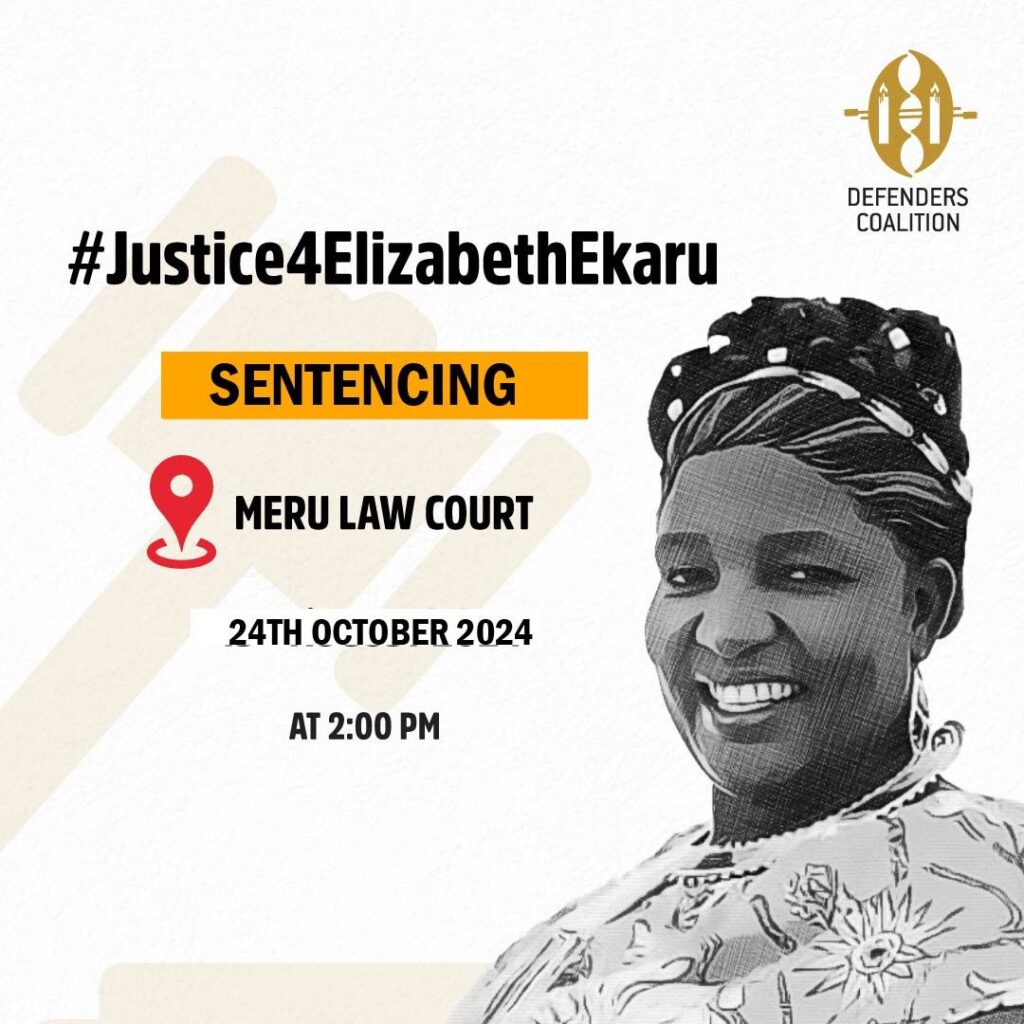 During the trial, Naweet claimed he had never encountered a woman who was outspoken and an activist, citing his traditional Turkana background. His defense exposed the patriarchal structures and cultural prejudices that often stand in the way of justice for women in Kenya.
During the trial, Naweet claimed he had never encountered a woman who was outspoken and an activist, citing his traditional Turkana background. His defense exposed the patriarchal structures and cultural prejudices that often stand in the way of justice for women in Kenya.
Following the sentencing, Grace Lolim of Isiolo Gender Watch lauded the court’s decision as a societal milestone in the battle for gender justice.
“This is not just a legal victory; it sets a new precedent for how cases involving violence against women should be handled in Kenya. We hope this will push for much-needed reforms that make justice for survivors of violence quicker and more accessible,” Lolim said.
Ekaru’s case has underscored the urgent need for stronger protection mechanisms for WHRDs in Kenya, as well as more gender-responsive laws to ensure that victims of violence, like Elizabeth Ekaru, are not silenced but rather supported and protected.
By holding Naweet accountable for his actions, the justice system has empowered other women advocates to continue their work without fear. It shows that Kenya is recognizing the work of Human Rights Defenders in the country. This legal victory is very timely and relevant in our society given the rising cases of violence against not only Women Human Rights Defenders but also the Human Rights Defenders Community at large.
The Defenders Coalition welcomes this groundbreaking sentence and appreciates the courts for honoring the duty placed upon it by the Constitution, to deliver justice while upholding national values of human rights and non-discrimination based on gender.
Elizabeth Ekaru’s courage and resilience will continue to inspire the women of Kenya and Human Rights Defenders across the world. As we honor her memory, we reaffirm our commitment to fight for a society where women’s voices are heard and recognized and that their rights are protected.
Read media Coverage here
https://www.facebook.com/share/v/1WCGCQzSiris4EAd/
https://thepresspoint.com/breaking-news/isiolo-human-rights-activist-killer-jailed-for-30-years/
https://ruraltimesnews.com/security-guard-lands-30-years-in-prison-for-killing-isiolo-activist
This joint submission was presented to the Human Rights Council at the Universal Periodic Review (UPR) of Kenya, focusing on the state of civil and political rights, particularly the freedom of assembly, association, and the protection of human rights defenders (HRDs). Submitted by the National Coalition of Human Rights Defenders (Defenders Coalition) in collaboration with key organizations including the Social Justice Centres Working Group, Coalition for Grassroot Human Rights Defenders, Protection International – Africa, Kenya Human Rights Commission, Pema Kenya, The Gay and Lesbian Coalition of Kenya (GALCK+), Universal Rights Group, Ogiek People’s Development Programme, and 0 this report sheds light on the growing challenges facing civic space in Kenya.
The submission outlines the systemic obstacles to the enjoyment of fundamental rights in Kenya, documenting instances of police brutality, repression of peaceful protests, and attacks on HRDs. It calls for urgent reforms to uphold Kenya’s obligations under international human rights standards and protect those working to safeguard the rights of all citizens.
Defenders Coalition – UPR Kenya Joint Submissions (2024) .docx
This submission is presented by DefendDefenders (East and Horn of Africa Human Rights Defenders Project), an NGO with Special Consultative Status with ECOSOC, in collaboration with the National Coalition of Human Rights Defenders-Kenya (Defenders Coalition). Submitted on 11 October 2024, this report aims to provide an overview of the state of human rights in Kenya, with a particular focus on the challenges faced by human rights defenders (HRDs) and key areas requiring reform and government action.
Our submission draws attention to the shrinking civic space, violations of fundamental freedoms, and the need for enhanced protection mechanisms for HRDs in Kenya. The review is a critical opportunity to hold Kenya accountable to its international human rights obligations and to strengthen the frameworks that ensure the safety, dignity, and rights of all its citizens.
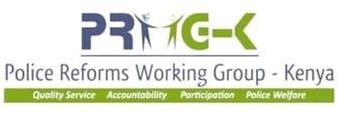 Nairobi, 21 October 2024: The Police Reforms Working Group is shocked by the Government of Kenya’s admission that Kenyan law enforcement and foreign affairs agencies played a role in the refoulement and forced return of Mustafa Genç, Öztürk Uzun, Alparslan Taşçı, and Hüseyin Yeşilsu, four Turkish nationals from Kenya to Turkey.
Nairobi, 21 October 2024: The Police Reforms Working Group is shocked by the Government of Kenya’s admission that Kenyan law enforcement and foreign affairs agencies played a role in the refoulement and forced return of Mustafa Genç, Öztürk Uzun, Alparslan Taşçı, and Hüseyin Yeşilsu, four Turkish nationals from Kenya to Turkey.
The principle of non-refoulement is a cornerstone of refugee protection. It has been recognised in international humanitarian law for more than seventy years. The 1951 United Nations Refugee Convention and its 1967 Protocol, 1969 OAU Convention on refugees and 2021 Refugee Law of Kenya explicitly prohibits the return of refugees to a place where they are likely to face the very danger from which they fled. These obligations cannot be traded for commercial, diplomatic or trade interests without violating both national and international law.
International refugee law recognizes that refugees may only be returned if they pose a danger to national security or, after due process, are found guilty of a crime that threatens the safety of others. No evidence that the four individuals posed any such threat has been provided by the Government of Kenya.
While the law recognizes there are exceptions to the principle of non-refoulment, the law also provides procedural safeguards. Rather than returning asylum seekers to governments that had fled from, a third country for safe resettlement could have been found.
Tragically, the Government has placed four human beings at grave risk as well as Kenya’s standing as a sanctuary nation for those fleeing persecution and war. It undermines Kenya’s credibility as the newest member of the United Nations Human Rights Council and torpedoes the United Nations Universal Periodic Review process planned for next year.
This weekend’s breach punctures Kenya’s legal commitments, its international moral standing and threatens three decades of confidence in Kenya’s humanitarian protection for the 780,000 refugees on Kenyan soil who need it today.
This statement is signed by the Police Reforms Working Group-Kenya, an alliance of national and grassroots organizations committed to professional, accountable, and human rights-compliant policing. They include: Independent Medico-Legal Unit (IMLU), Kariobangi Paralegal Network, Defenders Coalition, Katiba Institute, Social Justice Centres Working Group (SJCW), Kenyan Section of the International Commission of Jurists (ICJ Kenya), International Justice Mission (IJM-K), HAKI Africa, Amnesty International Kenya, Women Empowerment Link, Social Welfare Development Program (SOWED), Kenya Human Rights Commission (KHRC), Federation of Women Lawyers (FIDA- Kenya), International Centre for Transitional Justice (ICTJ – Kenya), Transparency International Kenya, Shield For justice, Wangu Kanja Foundation, Constitution and Reform Education Consortium (CRECO), Kenyans for Peace, Truth and Justice (KPTJ) and Peace Brigades International Kenya (PBI Kenya)
In the heart of Isiolo County, Betty Luke stands as a beacon of hope for marginalized groups, using her voice as a passionate human rights journalist to shine a light on the issues that often go unnoticed. With every article she writes, Betty seeks to raise awareness of the injustices faced by the vulnerable, turning their struggles into compelling stories that demand attention. “I believe that everyone deserves to have their story told,” she says, underscoring her commitment to advocacy.
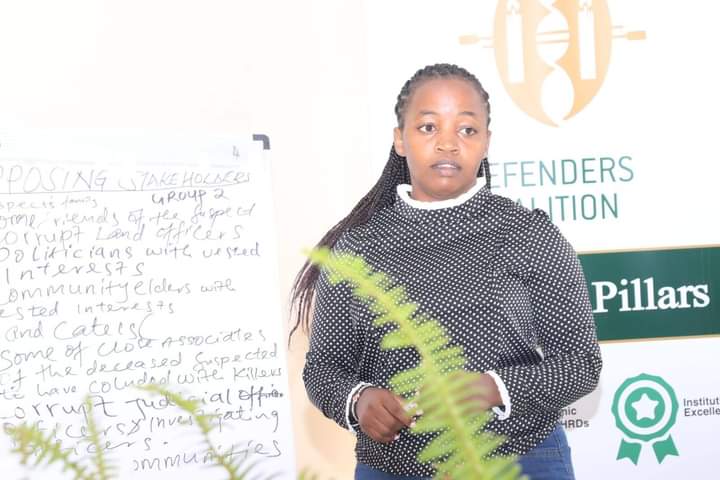
In 2023, Betty took a significant step in her journey by attending the Human Rights Defenders Academy. The experience was transformative, equipping her with the tools to enhance her advocacy work. One of the most impactful aspects of the academy was the wellness clinic. “The clinic taught me to always pause and appreciate myself, then re-strategize,” she reflects. This lesson was a revelation for Betty, who often found herself overwhelmed by the heartbreaking stories she encountered—especially when the pursuit of justice for victims felt painfully out of reach.
In the past, Betty’s drive for success had sometimes led to feelings of inadequacy. “I always wanted success, and whenever it didn’t happen, I imagined I had done something wrong,” she admits. However, the academy helped her recognize that every effort counts, and it’s essential to celebrate progress, no matter how small. This newfound perspective has allowed her to cultivate resilience in her work, ensuring that her passion for human rights journalism continues to thrive, even amidst challenges.
The skills Betty gained at the HRD Academy have had a profound impact on her work. Armed with digital safety techniques, she successfully fortified her news website against URL redirection attacks that had plagued her previously. This newfound digital security means she can continue to publish critical stories without interruption, providing a vital platform for marginalized voices in Isiolo.
One of the most memorable moments from her time at the academy was hearing the inspiring story of Kamau Ngugi, whose activism led him into exile. “His journey inspired me so much,” she shares, drawing strength from the courage and resilience displayed by other human rights defenders. “It reminded me that our work is vital, no matter the challenges we face.”
Today, Betty Luke continues her vital mission with renewed vigor and purpose. She is not only better equipped to protect her platform and her mental well-being, but she is also more inspired than ever in her pursuit of justice for marginalized communities in Isiolo. “Every story matters,” Betty emphasizes, “and I will keep telling them until justice is served.” Through her unwavering dedication, Betty is helping to build a world where every voice is heard, every story is told, and every individual is treated with dignity and respect.
Hon. Prof. Rémy Ngoy Lumbu
Chairperson, African Commission on Human and Peoples’ Rights
Special Rapporteur on Human Rights Defenders,
Focal Point on Reprisals in Africa,
Focal Point on Judicial Independence in Africa,
Dear Hon. Chairperson,
Re: Communication from the Pan African Lawyers Union regarding the ongoing threats to the independence of the legal profession in the United Republic of Tanzania
The Pan African Lawyers Union (hereinafter PALU) submits that the independence of the legal profession in the United Republic of Tanzania (hereinafter Tanzania) is under a systemic threat. PALU has been monitoring the events in Tanzania since 2019 and is deeply concerned considering the most recent developments.
Background
Since 2015 lawyers in Tanzania have faced numerous challenges from various branches of government including executive, legislative, and judicial institutions. The systemic suppression and subsequent weakening of the legal profession began with the enactment of the Advocates Act of 2015 by parliament. This Act threatened the independence of the legal practitioners in the country by granting discretion and access to Advocates’ conduct management to key members of the Executive.
Provisions of this Act, including Section 4, grants powers to the Attorney General (AG) or Deputy Attorney General (DAG) and the Director of Public Prosecution (DPP) over disciplinary measures of legal practitioners by making part of the composition of the Advocates Committee whose mandate is to take disciplinary proceedings against lawyers in the country. Other notable provisions of this Act include the structure of the Committee, decision-making by a simple majority, the quorum requirements, and the broad discretion granted to the AG in scheduling meetings and initiating misconduct proceedings against advocates.
Whereas the Advocates’ Act was amended in 2019, provisions pertaining to the discipline and conduct control of the profession remained. The current Advocates Act of 2019, significantly alters the governance and subsequently the independence of lawyers in the country, as it has granted officers of the executive, excessive involvement in the management of the legal profession In the country.
Findings
Since 2019, we have documented numerous instances of retaliatory administrative actions against lawyers, particularly by the Advocates’ Committee. These include the retaliatory institution of proceedings for disbarment, suspension of licenses and other forms of professional reprisals. We have also noted several instances of intimidation tactics such as arbitrary arrests, detention and threats employed against lawyers in the country.
So far, we have recorded thirteen cases of reprisals against lawyers in Tanzania. These include six proceedings initiated by the AG at the Advocates Committee, resulting in four suspensions between 2020 and now. Additionally, there have been several cases involving threats to life—one of which forced a lawyer to temporarily seek exile—and instances of arbitrary arrests and detention. These situations sorted by year, include:
In Kenya: in 2024, following June – August Genz Protests following controvercial punitive tax laws more that 1600 individuals were arrested and charged under various laws. It took the leadership of the Law Society of Kenya to partner with CSOs including Defenders Coalition to ensure all protesters were freed and bail paid. Lawyers including the president of LSK were threatened with abductions. When the LSK filed a Harbeas Corpus against abduction of 3 HRDs and the police failed to act resulting to a contempt of court against the Acting Inspector General of Police, the Judging presiding the matter had his security withdrawn. In another incident a magistrate was short dead when she read an unfavourable judgement against a police officer.
Recommendations
The above accounts demonstrate a series of unfortunate outcomes that seriously undermine the capacity of the Judiciary and legal profession to effectively play their role in defense of their Constitution and laws of Tanzania, African Human and Peoples’ Rights standards, as well as ensuring the existence of an independent and impartial judiciary.
PALU would like to reiterate the goals envisioned in Agenda 2063 which includes an Africa with a universal culture of good governance, democratic values, respect for human rights, justice and rule of law. This goal cannot be attained in the absence of an independent, and impartial judiciary supported by an independent legal profession and strong bar associations working together within the confines of the law to ensure and promote equal access to justice for all.
Moreover, ASCHPR/Res. 570(LXXVII) 2023 comprehensively outlines the relevant standards for Judicial Independence in Africa. These standards specifically provide for the role of a strong and independent legal profession and stipulate the need for judicial independence and impartiality.[1] Furthermore, a legitimate democracy, underpinned by the rule of law, requires an active and vibrant civil society, independent oversight mechanisms and human rights defenders.
With appreciation for the activities of the Honorable Commissioner’s office and recognition of your mandate as the Focal Point for judicial independence in Africa, we request engagement with the situation in Tanzania. We make the following recommendations: –
We highly value our longstanding partnership with the African Commission and remain available to support and facilitate the office of the Focal Point in this and other matters.
Please receive the assurances of our highest considerations.
Yours Faithfully,
Donald Deya,
Chief Executive Officer, Pan African Lawyers Union (PALU)
[1] The UN Basic Principles on the Role of Lawyers (paragraph 23) and IBA Standards for Independence of the Legal Profession guarantee the right of Members of Bar Associations, collectively or individually, to take part in public discussion of matters concerning the law and the administration of justice.
In the heart of Kajiado County, where the vast landscapes and forests have been a source of life for generations, one man has taken on the role of protector—Sankara Nyagaya. As an environmental rights defender, Sankara’s passion for preserving the land and fighting for climate justice comes from a deep-rooted connection to his community and the natural world around him. For years, he’s been advocating for the protection of these spaces, ensuring that future generations will have a place to call home.
In December 2023, Sankara attended the Human Rights Defenders Academy, an experience that would transform his approach to advocacy. “I went in thinking I was just going to learn about environmental rights,” Sankara recalls, “but what I left with was so much more. The focus on mental health and well-being for human rights defenders, along with the training on cybersecurity, made me realize how important it is to protect not just the land, but myself and my work.”
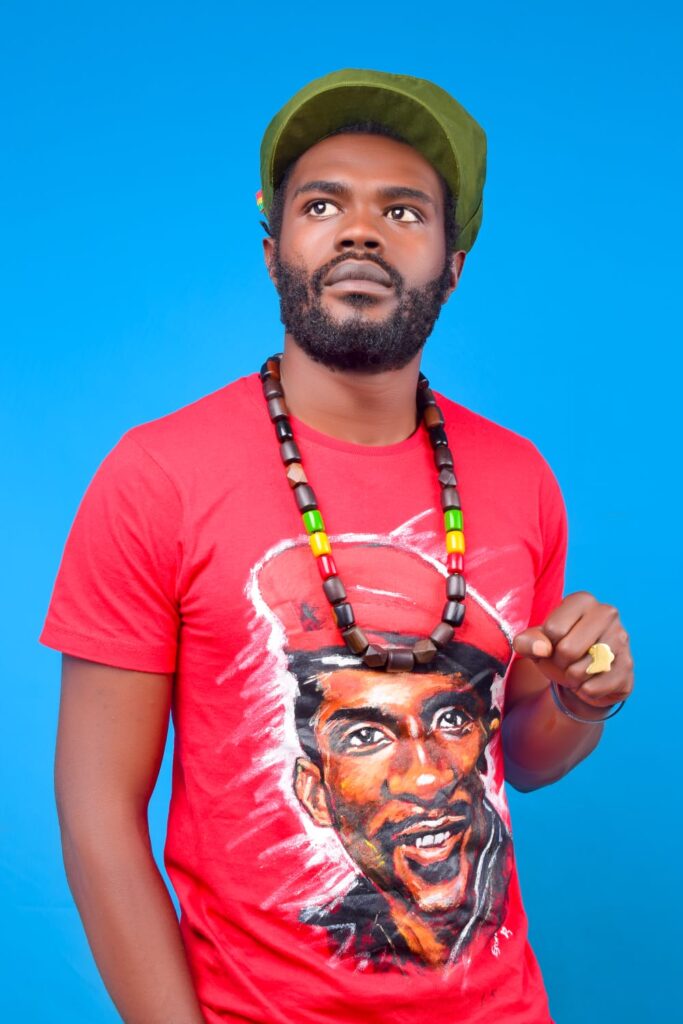
Sankara had always been passionate about the environment, but after the Academy, he became even more determined to lead. With his newfound skills, he spearheaded a protest against the illegal encroachment of a gazetted forest block in Kajiado. “It wasn’t easy,” he admits. “But the training I received on environmental rights and the support from my community gave me the strength to stand up, speak out, and organize.”
The Academy didn’t just provide skills—it created a network of allies that Sankara continues to lean on. Shortly after the training, he partnered with Sophie Adhiambo from Natural Justice, whom he had met during the Climate Justice sessions at the Academy. Together, they started community dialogues on a critical issue facing Kajiado: the construction of a nuclear waste facility. “People were scared and confused about what was happening, but through the Academy’s network, we were able to organize, educate the community, and present a petition against the project,” Sankara shares.
For Sankara, the Academy’s impact wasn’t only in the skills or connections he gained but also in the moments of solidarity. “I remember the opening session clearly,” he reflects, “we all came together, people from all over Kenya, sharing our struggles and dreams. There was this collective energy, a feeling that we were all in this fight together. That sense of unity has stayed with me, and it keeps me going when the work gets hard.”
Sankara’s journey as a human rights defender is far from over. He continues to organize, to fight for the land that sustains his community, and to push back against powerful interests that threaten the environment. His leadership, inspired by the lessons and relationships formed at the HRD Academy, shows that one person, standing with their community, can make a difference. As he looks to the future, Sankara remains hopeful, knowing that the fight for climate justice is not just about protecting the land, but about ensuring that his community’s voice is heard, loud and clear.
Dear Partner, Colleague and Comrade,
In this newsletter, you will find updates on our ongoing projects, successful campaigns, and impactful initiatives to enhance the safety and security of human rights defenders in Kenya.
We’d like to encourage you to take a moment to read through the newsletter and familiarize yourself with the important work we are doing. We also invite you to share the newsletter within your networks to help raise awareness and amplify our collective efforts.